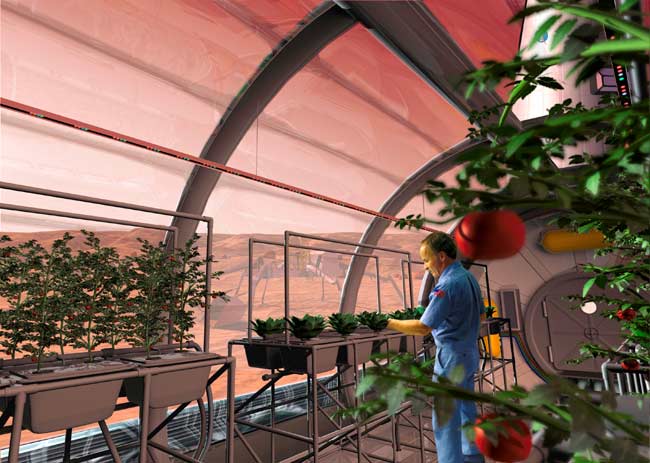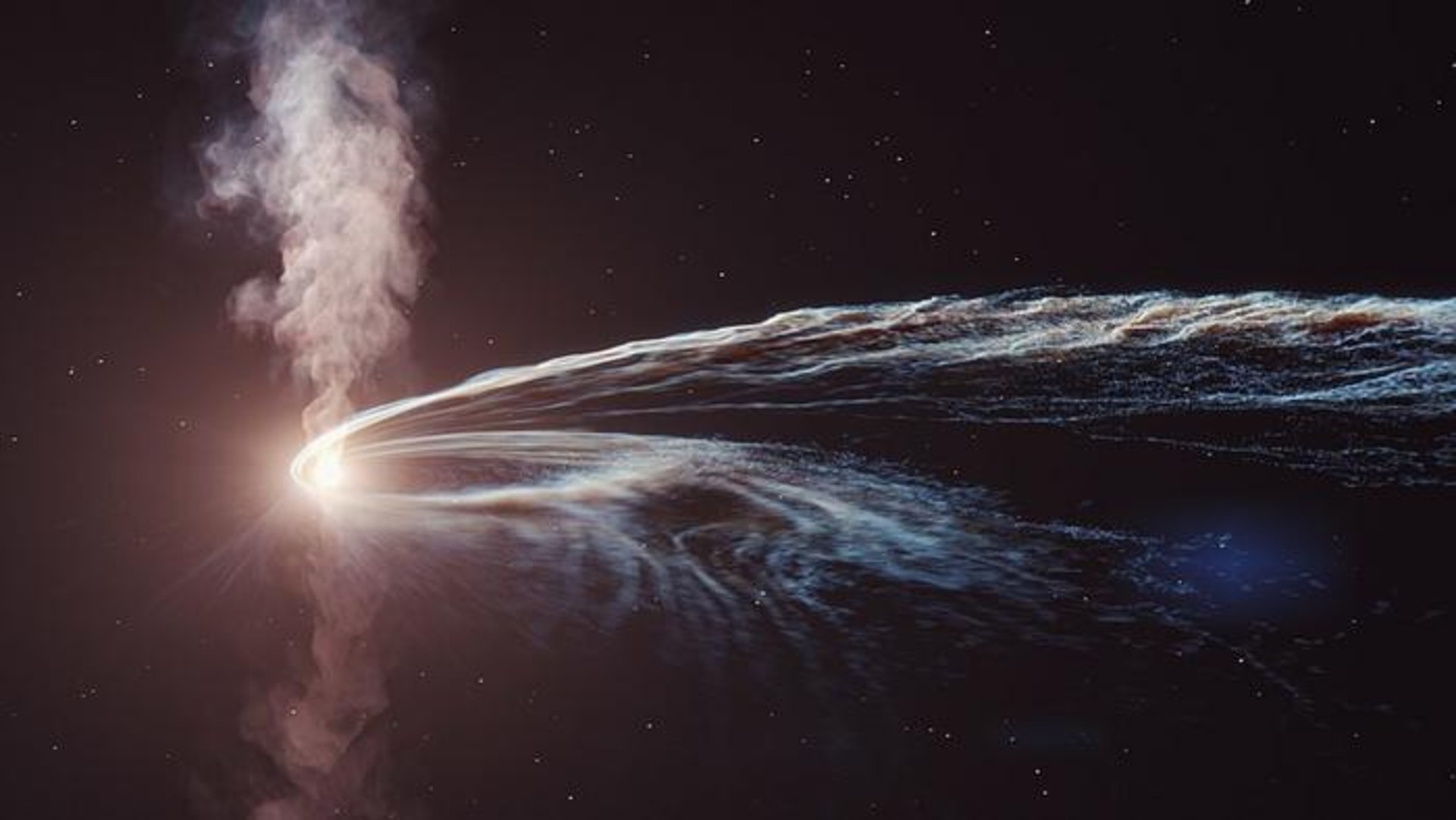Could Space Farmers Grow Crops On Other Planets?

Breaking space news, the latest updates on rocket launches, skywatching events and more!
You are now subscribed
Your newsletter sign-up was successful
Want to add more newsletters?

Delivered daily
Daily Newsletter
Breaking space news, the latest updates on rocket launches, skywatching events and more!

Once a month
Watch This Space
Sign up to our monthly entertainment newsletter to keep up with all our coverage of the latest sci-fi and space movies, tv shows, games and books.

Once a week
Night Sky This Week
Discover this week's must-see night sky events, moon phases, and stunning astrophotos. Sign up for our skywatching newsletter and explore the universe with us!

Twice a month
Strange New Words
Space.com's Sci-Fi Reader's Club. Read a sci-fi short story every month and join a virtual community of fellow science fiction fans!
Sciencefiction lovers aren't the only ones captivated by the possibility ofcolonizinganother planet. Scientists are engaging in numerous research projectsthatfocus on determining how habitable other planets are for life.
Mars,for example, is revealing more and more evidence that it probably oncehad liquid water on its surface, and could one day become ahome away fromhome for humans.
"Thespur of colonizing new lands is intrinsic in man," said GiacomoCertini, aresearcher at the Department of Plant, Soil and Environmental Science(DiPSA) atthe University of Florence, Italy. "Hence expanding our horizon tootherworlds must not be judged strange at all. Moving people and producingfoodthere could be necessary in the future."
Humanstraveling to Mars, to visit or to colonize, will likely have to makeuse ofresources on the planet rather than take everything they need with themon aspaceship. This means farmingtheir own food on another planet that has a very differentecosystem thanEarth's.
Certiniand his colleague Riccardo Scalenghe from the University of Palermo,Italy, recentlypublished a study in Planetary and Space Sciencethat makes someencouraging claims. They say the surfaces of Venus, Mars and the moonappear suitablefor agriculture. [BestSpaceFoods of All Time]
Knowyour (space) soil
Beforedeciding how planetary soils could be used, the two scientists had tofirstexplore whether the surfaces of the planetary bodies can be defined astruesoil.
Breaking space news, the latest updates on rocket launches, skywatching events and more!
"Apartfrom any philosophical consideration about this matter, definitelyassessingthat the surface of other planets is soil implies that it 'behaves' asa soil,"said Certini. "The knowledge we accumulated during more than a centuryofsoil science on Earth is available to better investigate the historyand thepotential of the skinof our planetary neighbors."
Oneof the first obstacles in examining planetary surfaces and theirusefulness inspace exploration is to develop a definition of soil, which has been atopic ofmuch debate.
"Thelack of a unique definition of 'soil,' universally accepted,exhaustive, and(one) that clearly states what is the boundary between soil andnon-soil makes itdifficult to decide what variables must be taken into account fordeterminingif extraterrestrial surfaces are actually soils," Certini said.
Atthe proceedings of the 19th World Congressof Soil Sciences held in Brisbane, Australia, in August, Donald JohnsonandDiana Johnson suggested a "universal definition of soil." Theydefined soil as "substrate at or near the surface of Earth and similarbodies altered by biological, chemical, and/or physical agents andprocesses."
OnEarth, five factors work together in theformation of soil: the parent rock, climate, topography, time and biota(or theorganisms in a region such as its flora and fauna). It is this lastfactor thatis still a subject of debate among scientists.
Acommon, summarized definition for soil is amedium that enables plant growth. However, that definition implies thatsoilcan only exist in the presence of biota. Certini argues that soil ismaterialthat holds information about its environmental history, and that thepresenceof life is not a necessity.
"Mostscientists think that biota is necessary to produce soil," Certinisaid. "Otherscientists, me included, stress the fact that important parts of ourownplanet, such as the DryValleys of Antarctica or the Atacama Desert of Chile, havevirtuallylife-free soils. They demonstrate that soil formation does not requirebiota."
Theresearchers of this study contend that classifying a material as soildependsprimarily on weathering. According to them, a soil is any weatheredveneer of aplanetary surface that retains information about its climatic andgeochemicalhistory.
OnVenus, Mars and the Moon, weathering occurs in different ways. Venushas adense atmosphere at a pressure that is 91 times the pressure found atsea levelon Earth and composed mainly of carbon dioxide and sulphuric aciddroplets withsome small amounts of water and oxygen.
Theresearchers predict that weathering on Venus could be caused by thermalprocessor corrosion carried out by the atmosphere, volcanic eruptions, impactsoflarge meteorites and wind erosion.
Marsis currently dominated by physical weathering caused by meteoriteimpacts andthermal variations rather than chemical processes.
Accordingto Certini, there is no active volcanism that affects the martiansurface butthe temperature difference between the two hemispheres causes strongwinds.Certini also said that the reddish hue of the planet's landscape, whichis aresult of rusting iron minerals, is indicative of chemical weatheringin thepast.
Onthe moon, a layer of solid rock is covered by a layer of loose debris.Theweathering processes seen on the Moon include changes created bymeteoriteimpacts, deposition and chemical interactions caused by solar wind,whichinteracts with the surface directly.
Somescientists, however, feel that weathering alone isn't enough and thatthepresence of life is an intrinsic part of any soil.
"Theliving component of soil is part of its unalienable nature, as is itsabilityto sustain plant life due to a combination of two major components:soilorganic matter and plant nutrients," said Ellen Graber, researcher attheInstitute of Soil, Water and Environmental Sciences at The VolcaniCenter ofIsrael's Agricultural Research Organization.
Oneof the primary uses of soil on another planet would be to use it foragriculture?to grow food and sustain any populations that may one daylive onthat planet. Some scientists, however, are questioning whether soil isreally anecessary condition for space farming.
Soillessfarming ? It's not science fiction
Growingplants without any soil may conjure up images from a "StarTrek"movie, but it's hardly science fiction. Aeroponics, as one soillesscultivationprocess is called, grows plants in an air or mist environment with nosoil andvery little water. Scientists have been experimenting with the methodsince theearly 1940s, and aeroponics systems have been in use on a commercialbasis since1983.
"Whosays that soil is a preconditiospace-farming-on-other-planets-101125.htmlnfor agriculture?" asked Graber. "There are two major preconditionsfor agriculture, the first being water and the second being plantnutrients.Modern agriculture makes extensive use of 'soilless growing media,'which caninclude many varied solid substrates."
In1997, NASA teamed up with AgriHouse andBioServe Space Technologies to design an experiment to test a soillessplant-growth system on board the Mir Space Station. NASA wasparticularlyinterested in this technology because of its low water requirement.Using thismethod to grow plants in space would reduce the amount of water thatneeds tobe carried during a flight, which in turn decreases the payload.
Aeroponically-growncrops also can be asource of oxygen and drinking water for space crews.
"Iwould suspect that if and whenhumankind reaches the stage of settling another planet or the Moon, thetechniques for establishing soilless culture there will be welladvanced,"Graber predicted.
Aliensoil: Key to the past and future
Thesurface and soil of a planetary bodyholds important clues about its habitability, both in its past and inits future.For example, examining soil features have helped scientists show thatearlyMars was probably wetter and warmer than it is currently.
"Studyingsoils on our celestialneighbors means to individuate the sequence of environmental conditionsthatimposed the present characteristics to soils, thus helping reconstructthegeneral history of those bodies," Certini said.
In2008, NASA's Phoenix Mars Lander performedthe first wet chemistry experiment using martian soil. Scientists whoanalyzedthe data said the Red Planet appears to have environments moreappropriate forsustaining life than was expected, environments that could one dayallow humanvisitors to grow crops.
"Thisis more evidence for water becausesalts are there," said Phoenix co-investigator Sam Kounaves of TuftsUniversity in a press release issued after the experiment. "We alsofound areasonable number of nutrients, or chemicals needed by life as we knowit."
Researchersfound traces of magnesium,sodium, potassium and chloride, and the data also revealed that thesoil wasalkaline, a finding that challenged a popular belief that the martiansurfacewas acidic.
Thistype of information, obtained throughsoil analyses, becomes important in looking toward the future todeterminewhich planet would be the best candidate for sustaining human colonies.
- Gallery? Future Mars Bases Envisioned, Top10 Space Foods
- HowMicrobes Could Help Colonize Mars
- LunarGreenhouse Could Grow Food For Future Moon Colonies
Thisstory is presented in cooperation with AstrobiologyMagazine, a web-based publication sponsored bythe NASA astrobiologyprogram.
Anuradha was a contributing writer to Space.com in the areas of Earth science, environmentalism, ecology, and space science. She was the former Director (International/Digital Media) at the Sri Lanka President’s Office and the Sri Lankan Government Spokesperson for the Commonwealth Heads of Government Meeting (CHOGM). Before that, she was the director of the Sri Lanka College of Journalism (SLCJ) before returning to Sri Lanka. Currently a Doctoral student and lecturer at the Newhouse School of Public Communications in Syracuse, New York.
